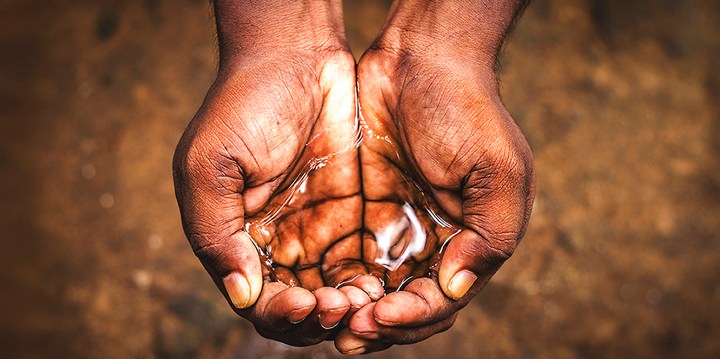POLLUTANT PERIL
Poison on tap — South Africa needs to get its act together on herbicides and pesticides, experts warn

The law needs an urgent update. That was the nub of a webinar discussion in which experts weighed in on the health threat of agrochemicals and other pollutants in South Africa’s water.
Against the backdrop of Gauteng’s water crisis, cholera deaths and the grim picture of South Africa’s water quality painted by the latest Blue Drop Watch Report, experts have again warned that pollutants such as herbicides and pesticides in water can increase the chances of diseases such as cancer, renal failure and diabetes.
In light of this, one of the experts – who took part in an “Unpoison Our Water” public webinar on Friday – said the call to manage pesticides needs urgent attention by policymakers and researchers.
An “update of the pesticide registration laws” was called for, while “national registration should be implemented to phase out highly hazardous pesticides immediately”, they said.
In the discussion – facilitated by Maverick Citizen editor Mark Heywood and Anna Shevel, Network Coordinator for the UnPoison Movement – the experts covered pesticide and agrochemical contamination; wastewater with toxic heavy metals from mines; antimicrobial chemicals and medication in sewage; the politics of water management; how water catchments are managed and how different catchments have different risks; the problems with our legal framework and using the law as a lever for positive change; and solutions for clean water and water availability in the future.
Read more in Daily Maverick: Bayer hit with $332m Roundup-cancer verdict by jury
Debbie Muir, specialist programme manager in the Department of Forestry, Fisheries and the Environment, says South Africa developed a highly hazardous pesticides (HHP) database and strategy, attempting to track and mitigate the use of HHPs. The number tracked had risen from 124 at the end of 2022 to 186 currently – 102 of which were environmental toxins.
‘Alarm bells’
Muir highlighted the use of atrazine and acrolein, which are among “the main agricultural water pollutants in South Africa”
“Atrazine is used mainly in the corn and wheat production areas in South Africa, and acrolein is the favourite pesticide used by the Department of Water and Sanitation for the control of algae, fungi and submerged aquatic weeds in their canals. This is where the alarm bells should be going off. Those canals are carrying drinking water to you… they are acutely toxic to aquatic organisms.
“This then accumulates in the fish and creates a bioaccumulation of toxins in humans through consumption… Atrazine is a human carotid, it is an endocrine disruptor, it’s reproductive and developmental toxin, a neurotoxicant, and it can cause renal failure and coma. An irritant, it is a bad pesticide.”
Muir said the risk posed by HHPs to biodiversity and ecosystem services is “unacceptable”. Pesticide exposure and environmental degradation “reduces the acceptable and clean-water service delivery to the public and the environment. This can lead to reduced species, richness in aquatic mesocosms and systems. National registration should be implemented to phase out HHPs immediately to mitigate further harm to people and the environment.”
In South Africa, deaths due to major noncommunicable diseases such as cancer, diabetes and chronic lower respiratory diseases increased by 58.7% over 20 years – from 103,428 in 1997 to 164,205 in 2018.

The vast majority of water supply systems (71%) failed to achieve chemical compliance, according to the latest Blue Drop Watch report. (Photo: dailyfriend.co.za / Wikipedia)
Time to update the act
James Dabrowski, an eco-toxicology expert whose work focuses on aquatic biodiversity, said that while there were benefits to using herbicides and pesticides – including preventing weeds and pest plagues and increasing food production – the call to manage pesticides is valid and needs urgent attention from policymakers and researchers.
Dabrowski also worked as a specialist scientist in the Department of Water and Sanitation, and was a principal researcher at the Council for Scientific and Industrial Research for more than a decade.
“In risk assessment, we have two components: Affect assessment [where] we look at what is the maximum amount an organism or ecosystem can be exposed to without experiencing any adverse effects; and exposure assessment, where we look what is the concentration that an organism will be exposed to under normal conditions of use, and we can call that a predicted environmental concentration,” he said.
The predicted environmental concentration was troubling when it was much higher than estimated because it would have adverse effects on humans, aqualife and the environment.
Dabrowski recommended an update of the pesticide registration laws since this could help risk assessors obtain more accurate predictions of environmental exposure and prevent adverse effects on humans and the environment.
Read more in Daily Maverick: Water shortages
To provide context, he pointed out that standards were “hell-level low” when the Pesticide Registration Act was enacted in the 1940s. “People could smoke in airplanes, in San Antonio, Texas they sprayed DDT in the streets because they thought it could cure polio at the time, construction workers would give present-day health and safety officers heart attacks if they saw how they worked, and apartheid was started in 1948, so a lot has changed in that time and it’s about time the act that regulates these highly toxic chemicals [is] updated.”
Dabrowski was joined in the webinar by Ferrial Adam of WaterCan, World Health Organization adviser and environmentalist Bettina Genthe, and water treatment and beneficiation expert Leslie Petrik, along with more than 100 concerned citizens.
Compliance failure
The latest Blue Drop Watch report says that South Africa’s water-treatment infrastructure and processes are, on average, “partially functional with an average performance”.
A total of 151 water supply systems were inspected, and the findings offer a representative overview of systems owned and operated by 140 municipalities and 26 water boards and bulk-water service providers. An average technical site assessment of 69% was achieved for the 151 systems.
Read more in Daily Maverick: We tried to lay criminal charges against Joburg for water pollution – the SAPS didn’t know how
“Chemical compliance analyses show that 16% and 14% have excellent and good water quality, respectively, whilst the vast majority of plants fail to achieve chemical compliance (71%). Thirteen water supply systems have no water quality data reported (no information), or no data has been uploaded or available at the time of the audit to enable analysis on compliance (four of these in the Free State, one each in Gauteng and Limpopo, three in Mpumalanga and four in the Northern Cape. Lack of monitoring or information automatically translates to zero compliance,” the report reads.
It continues: “The Department of Water and Sanitation notes with concern the overall poor water quality that is produced and distributed to the consumer. A balanced view is also taken on the results from the technical assessments, showing systems that range from excellent to critical. The Blue Drop Watch will be used as a basis to inform appropriate regulations and support to facilitate correction, restoration, and improvement of water services to consumers. The report further serves to inform stakeholders and government departments as to the current status of drinking water infrastructure in the field, with the intent to mobilise rectification measures without having to wait for the release of the Blue Drop audit report.”
The regulator would continue to monitor performance in terms of section 62 of the Water Services Act, and engage together with the Department of Cooperative Governance and Traditional Affairs, the South African Local Government Association and the Municipal Infrastructure Support Agent, all water institutions that fail to meet safe drinking water standards.
“Should corrective actions fail, the department will consider civil action together with actions contemplated under section 63 of the Water Services Act (Act 108 of 1997) to ensure that ministerial directives are issued with timeframes for implementation. Failure to respond will trigger remedial action to be taken at the cost of the noncomplying entity or municipality.”
The department would take steps to improve its capacity to respond more effectively in this duty, in ensuring visible and measurable improvement in drinking-water services. DM





















 Become an Insider
Become an Insider
“Should corrective actions fail, the department will consider civil action together with actions contemplated under section 63 of the Water Services Act (Act 108 of 1997) to ensure that ministerial directives are issued with timeframes for implementation. Failure to respond will trigger remedial action to be taken at the cost of the noncomplying entity or municipality.” Believe when you see.
I refer to ‘Pollutant Peril – Poison on Tap’ published in the DM by Naledi Sikhakhane on 9 November. Debbie Muir is widely quoted targeting acrolien as a ‘main agricultural water pollutant’. It is insinuated that acrolien is a drinking water contaminant, is carcinogenic, bio-accumulates and other false statements. Clearly the comments indicate that Sikhakhane and Muir do not understand the product and its specific characteristics. It is always easy for people on a public stage/webinar to attack ‘pesticides’ as they are the cause of almost every disease and pollution problem according to self-professed experts. Acrolein is not carcinogenic, is not mutagenic, is not genotoxic, does not have any reproductive effects in animals and can not be linked to chronic respiratory disease. It readily hydrolyses in water with a pH of between 5 and 10 and degrades to carbon dioxide and water within 4 hours to 4 days; it is rapidly degraded by sunlight and dissipates totally with 8 days; it is also rapidly degraded by oxygen and must be kept in oxygen-free containers to prevent degradation; it is highly volatile and rapidly dissipates into the atmosphere when released as when it is used to clean irrigation systems. Acrolein is used to clean irrigation canal systems of weeds, aquatic organisms and algae to enable infrastructure maintenance to take place. Weeds in canals create blockages, spillage and erosion of structures; crabs are a major problem in excavating under concrete structures which then collapse; algae cause system blockages and blockages in irrigation equipment. What is the alternative to enable these problems to be addressed and rectified?
Acrolien is registered and controlled by a single licensed company; it is applied by a professional trained team; all product is controlled and it is not available to the public.
As for changes in legislation, there is no indication of what is wrong with existing legislation. What changes are required? The relevant authorities and industry have withdrawn or banned many agrochemicals when justified by scientific findings.
The biased comments by Sikhakhane and Muir are not based on scientific facts and acrolein is definitely not a major water pollutant in South Africa. The issue of sewage, destruction of wetlands, informal settlement water pollution and other causes are conveniently ignored. They owe your readers and the company responsible for acrolein in South Africa (Envirokonsult) a written public apology.